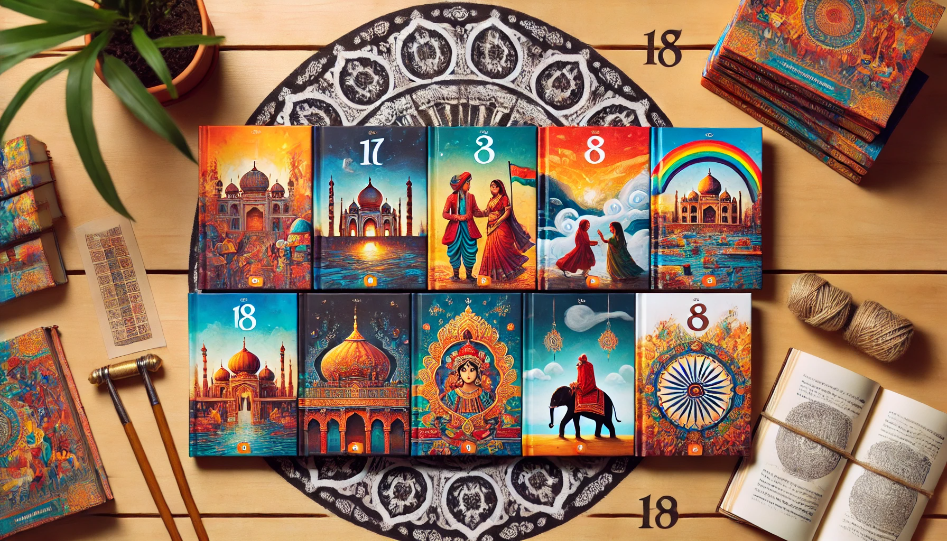Top 10 Indian Books You Must Read: A Journey Through Literary Excellence
-
Richard Pen
| Sunday 28th of July 2024 03:22:24 PM (UTC)

India, with its rich cultural heritage and diverse history, has produced some of the most compelling and thought-provoking literature in the world. Indian authors have contributed significantly to the global literary landscape, offering readers a unique blend of tradition, modernity, and unparalleled storytelling. If you're looking to dive into the best of Indian literature, here are the top 10 Indian books you should definitely read.
1. "Midnight's Children" by Salman Rushdie
Salman Rushdie's "Midnight's Children" is a landmark novel in Indian literature. Winner of the Booker Prize in 1981 and the Booker of Bookers in 1993, this book is a magical realist take on India's transition from British colonialism to independence and the partition of India. The protagonist, Saleem Sinai, born at the exact moment of India's independence, finds himself with telepathic powers, symbolizing the hopes and anxieties of the nation.
2. "The God of Small Things" by Arundhati Roy
Arundhati Roy's debut novel, "The God of Small Things," won the Booker Prize in 1997 and is a poignant exploration of forbidden love and societal norms in Kerala, India. The narrative weaves through the lives of fraternal twins Estha and Rahel, capturing their experiences with heartbreaking beauty and lyrical prose.
3. "A Suitable Boy" by Vikram Seth
"A Suitable Boy" is a sprawling, epic novel by Vikram Seth, set in post-independence India. This massive work of over 1,300 pages follows the life of Lata Mehra and her quest for a suitable husband, offering a detailed portrait of Indian society in the 1950s. The novel's intricate plot and rich characterizations make it a must-read for anyone interested in Indian culture and history.
4. "The White Tiger" by Aravind Adiga
Aravind Adiga's "The White Tiger" won the Booker Prize in 2008 and provides a darkly humorous and incisive critique of India's class struggle. Through the eyes of Balram Halwai, a village boy turned successful entrepreneur, the novel exposes the harsh realities of social and economic inequality in contemporary India.
5. "Train to Pakistan" by Khushwant Singh
Khushwant Singh's "Train to Pakistan" is a haunting tale of the partition of India in 1947. Set in the fictional village of Mano Majra, the novel captures the communal violence and human tragedy of partition with stark realism and emotional depth. Singh's evocative storytelling brings to life the harrowing experiences of those caught in the crossfire.
6. "The Guide" by R.K. Narayan
"The Guide" is one of R.K. Narayan's most celebrated works, blending humor, romance, and philosophical reflection. The story follows Raju, a tourist guide who transforms into a spiritual guru, and explores themes of identity, redemption, and the nature of human relationships. Narayan's simple yet profound writing style has endeared him to readers worldwide.
7. "Interpreter of Maladies" by Jhumpa Lahiri
Jhumpa Lahiri's Pulitzer Prize-winning collection of short stories, "Interpreter of Maladies," delves into the lives of Indian immigrants in America. Each story is a poignant exploration of cultural displacement, identity, and the complexities of human emotions. Lahiri's elegant prose and keen insight into the human condition make this collection a standout.
8. "Shantaram" by Gregory David Roberts
Though not originally an Indian author, Gregory David Roberts' "Shantaram" is a novel deeply intertwined with the spirit of Mumbai. Based on the author's own experiences, the book follows an Australian fugitive who finds a new life in the bustling streets of Mumbai. The novel's vivid descriptions and gripping narrative provide a fascinating look into the heart of India's most vibrant city.
9. "In Custody" by Anita Desai
Anita Desai's "In Custody" is a powerful exploration of the struggles of a small-town college lecturer, Deven, who is obsessed with Urdu poetry. Tasked with interviewing a famous poet, Deven's journey reveals the decline of the once-flourishing Urdu culture. Desai's poignant storytelling highlights the themes of loss, cultural erosion, and the pursuit of dreams.
10. "Palace of Illusions" by Chitra Banerjee Divakaruni
"Palace of Illusions" by Chitra Banerjee Divakaruni is a retelling of the ancient Indian epic, the Mahabharata, from the perspective of Draupadi, one of its central characters. This feminist reimagining gives voice to Draupadi's struggles, desires, and resilience, offering a fresh and engaging perspective on a timeless story.
Conclusion
These top 10 Indian books provide a window into the rich tapestry of Indian culture, history, and society. Each of these works, with its unique narrative and profound insights, has left an indelible mark on the world of literature. Whether you're a seasoned reader or new to Indian literature, these books promise an unforgettable journey through the heart and soul of India. So, pick up one of these masterpieces and immerse yourself in the captivating world of Indian storytelling.
For more literary recommendations, check out our article on the Top 10 Bestselling Books Worldwide: Where and In What Languages They Shine. If you found this article helpful, share it with fellow book lovers and let them embark on this literary journey through India! For more recommendations and reviews, stay tuned to our blog.
Start the conversation
Become a member of TxtTale to start commenting.
Already a member?
